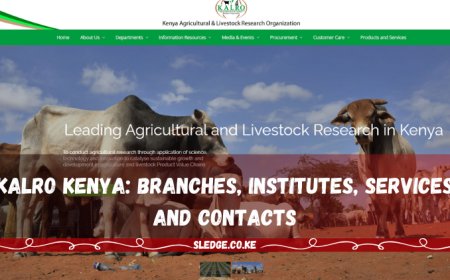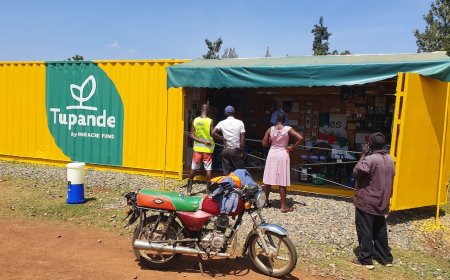TOP KMTC Courses for Students with KCSE Grade D- in Kenya For 2024
This article will discuss several medical courses available for students with KCSE D-, D plain, and D+ grades. We will also examine their entry requirements, duration, and career prospects.

Have you ever dreamed of pursuing a career in the medical field in Kenya but thought your KCSE grade might not open those doors for you? Well, think again! The Kenya Medical Training College (KMTC) offers hope for students who have secured a minimum grade of D- in their KCSE. This incredible opportunity allows aspiring healthcare professionals to embark on a journey toward fulfilling and impactful careers in the medical sector.
KMTC, established in 1927, has become a cornerstone of medical education in Kenya. With over 65 constituent colleges spread across the country, it prides itself on nurturing competent health professionals who significantly contribute to the healthcare system locally and globally. The college's commitment to inclusivity and quality education is evident in its diverse courses tailored to meet various academic thresholds. This inclusivity ensures that every Kenyan student, regardless of their KCSE grade, has a path to pursue their passion in the healthcare field.
Specifically, for those with a minimum D-grade, KMTC provides a selection of certificate courses. These courses are not just a study program but a gateway to meaningful careers where each day is about making a difference in people's lives. Whether it's providing critical nutritional advice, supporting patients in their healthcare journey, or ensuring the smooth operation of medical facilities, the skills and knowledge gained from these courses are invaluable.
This blog post aims to shed light on these accessible KMTC medical courses, delving into the specifics of each program, the opportunities they present, and how you, with a minimum grade of D-, can embark on this promising path. So, let's dive in and explore how KMTC makes medical education attainable for all, ensuring every student can contribute to Kenya's healthcare sector.
Understanding the KMTC Admission Criteria
The Kenya Medical Training College (KMTC) is pivotal in Kenya’s healthcare education system. It's not just an academic institution; it's a launchpad for many aspiring healthcare professionals. Understanding the admission criteria is crucial for anyone looking to embark on this journey, especially for students with a KCSE minimum grade of D-.
General KMTC Admission Requirements
Before diving into the specifics of D-grade students, let's look at the general admission requirements at KMTC. Generally, KMTC seeks students who demonstrate a passion and aptitude for healthcare. The requirements often include a minimum KCSE grade (depending on the course), specific grades in relevant subjects like English, Kiswahili, Biology, Chemistry, and Mathematics, and other criteria such as age and physical fitness.
Courses Available for D- D-Grade Students
Now, let's focus on the beacon of hope for students who have secured a minimum grade of D-. KMTC acknowledges that grades sometimes reflect a student's potential or passion for healthcare. As such, it offers several courses tailored to students who might have yet to attain higher grades but still desire to make a difference in the medical field.
1. Certificate in Health Support Service
- Minimum Requirements: A mean grade of D- in KCSE.
- Course Overview: This course provides foundational knowledge and skills necessary for various support roles within healthcare settings. It's examined by the National Industrial Training Authority (NITA) and is available at institutions like Outspan Medical College in Nyeri and several other medical colleges across Kenya.
2. Certificate in Health Records and Information Technology (In-Service category)

- Minimum Requirements: For those already working in the records department without professional qualifications, a mean grade of D+, D+ in English or Kiswahili, and D- in Mathematics is required. Additionally, two years of work experience in the Health Records and Information Department and recommendations and appointment letters are necessary.
3. Certificate in Health Promotion for the Deaf (CHPD)
- Minimum Requirements: Specifically designed for deaf students, this course requires a mean grade of D+, D+ in English or Kenya Sign Language, and a D (Plain) in Biology. It also requires a D in one of several subjects, including Mathematics, Biology, Chemistry, or General Science.
Why These Courses Matter
These courses are more than just educational programs; they are vital cogs in the healthcare system. For instance, the Certificate in Health Support Service creates professionals who ensure that healthcare environments are safe and efficiently managed. Specializing in health records and information technology is crucial in managing patient data, a backbone of modern healthcare. Meanwhile, the Certificate in Health Promotion for the Deaf addresses a unique and often underserved community, ensuring that deaf individuals receive proper health education and services.
Ensuring Quality and Accessibility
KMTC’s mission is to make healthcare education accessible to all, reflecting the belief that every individual has the potential to contribute meaningfully to the health sector. By providing courses for students with grades as low as D-, KMTC demonstrates its commitment to inclusivity and quality education. These programs are carefully designed to ensure that graduates are not just qualified but are compassionate and competent healthcare providers who can meet the diverse needs of Kenya's population.
Detailed Course Options and Requirements
Navigating the array of medical courses the Kenya Medical Training College (KMTC) offers can be an exhilarating journey for aspiring healthcare professionals. For those who've achieved a KCSE minimum grade of D (plain) or D-, there's a variety of specialized certificate courses available, each with its unique focus and set of prerequisites. In this section, we'll delve into the specifics of these courses, providing a detailed look at what each entails and the opportunities they offer.
For KCSE Minimum Grade D (plain)
1. Certificate in Dietetics and Nutrition
- Minimum Requirements: D plain in KCSE with similar grades in English, Biology/Biological Sciences, and a D (plain) in either Chemistry, Mathematics, Home Science, Physics, Agriculture, or General Sciences.
- Course Overview: This course prepares students to become experts in dietetics and nutrition, essential for promoting healthy eating habits and designing dietary treatments to prevent and manage diseases. Graduates find opportunities in hospitals, community health programs, and research institutions.
2. Certificate in Operation Theatre Technology

- Minimum Requirements: D plain in KCSE.
- Course Overview: Students learn the ins and outs of operating theatre procedures, including sterilization, equipment management, and assisting in surgical procedures. It's a critical role that contributes significantly to surgical operations and patient caresuccess.
3. Certificate in Palliative Care and Gerontology
- Minimum Requirements: D plain in KCSE.
- Course Overview: This course focuses on caring for the elderly and those with life-limiting illnesses. Students learn about pain management, psychological support, and end-of-life care, providing comfort and quality of life to patients and their families.
4. Certificate in Counselling Psychology
- Minimum Requirements: D plain in KCSE.
- Course Overview: Students are trained in psychological support strategies, helping individuals cope with stress, trauma, and mental health issues. Graduates can work in schools, hospitals, and community settings to provide much-needed support.
5. Certificate in Foundations in Community Health
- Minimum Requirements: D plain in KCSE.
- Course Overview: This foundational course is designed for those interested in basic community health services. It suits candidates working as Community Health Assistants or in related areas. The course is brief but impactful, providing essential skills for grassroots healthcare.
For KCSE Minimum Grade D-
1. Certificate in Health Support Service
- Minimum Requirements: D- in KCSE.
- Course Overview: This course offers training in various support roles within healthcare settings, ensuring that medical facilities operate smoothly and effectively. It's a vital role that underpins the functionality of healthcare services.
2. Certificate in Nutrition & Dietetics
- Minimum Requirements: D+ in English or Kiswahili and Biology/Biological Sciences, D in Chemistry/Physical Science, and a D in one other related subject.
- Course Overview: Similar to the dietetics and nutrition course for D plain students, this program focuses on individuals' and communities' nutritional needs and health. Graduates play a crucial role in health promotion and disease prevention through nutritional education and management.
3. Certificate in Medical Engineering
- Minimum Requirements: D in Mathematics, Physics/Physical Sciences, or Chemistry, and a D in another technical subject.
- Course Overview: This course prepares students to maintain and repair medical equipment, an essential aspect of modern healthcare. Technicians ensure that medical devices are safe, functional, and up-to-date, contributing to effective patient care.
4. Certificate in Orthopaedic Trauma Medicine

- Minimum Requirements: D+ in Biology/Biological Sciences and a D+ in one other related subject.
- Course Overview: Formerly known as Certificate in Orthopaedic Plaster Technology, this course trains students in managing and treating musculoskeletal injuries and conditions. It's a specialized field where practitioners make a real difference in patient recovery and quality of life.
5. Certificate in Environmental Health Sciences
- Minimum Requirements: D+ in Biology/Biological Sciences, D in Mathematics, and a D in one other related subject.
- Course Overview: This Public Health Technician Course focuses on identifying and controlling environmental hazards that affect public health. Graduates are equipped to assess and mitigate risks in various settings, contributing to the health and safety of communities.
Each course represents a unique pathway into the healthcare sector, providing essential skills and knowledge that contribute to the well-being of individuals and communities. By meeting the entry requirements and committing to the study, students can embark on rewarding careers that make a real difference in the lives of others. Whether through direct patient care, technical support, or community health initiatives, the opportunities for graduates of these KMTC courses are varied and fulfilling.
Career Paths and Opportunities
The journey through the Kenya Medical Training College (KMTC) courses doesn't just end with a certificate; it's the beginning of diverse and fulfilling career paths in the healthcare sector. Graduates from these courses, even those who started with a minimum grade of D- in their KCSE, are equipped with practical skills and knowledge that open doors to various career opportunities. Let's explore the potential paths that await these diligent students.
Career Opportunities for Certificate Holders
1. Certificate in Dietetics and Nutrition
- Potential Career Paths: Graduates can become nutritionists or dietetic technicians in hospitals, nursing homes, or public health offices. They are crucial in creating dietary plans, supporting patients with specific nutritional needs, and promoting healthy eating habits within communities.
2. Certificate in Operation Theatre Technology
- Potential Career Paths: Operating theatre technicians are vital in any surgical team. They ensure that the operating theatre is prepared, equipment is functional, and surgeons have the necessary support during procedures. These professionals can work in hospitals, outpatient surgery centers, and specialized clinics.
3. Certificate in Palliative Care and Gerontology
- Potential Career Paths: With this certificate, graduates can work in hospices, nursing homes, or as part of home health teams, providing care and support to the elderly and terminally ill patients. Their work is not just medically vital; it provides comfort and dignity to individuals in their final stages of life.
4. Certificate in Counselling Psychology
- Potential Career Paths: Counselling psychologists work in various settings, including schools, hospitals, and private practices. They help individuals cope with stress, overcome personal challenges, and improve their mental well-being. Their work is crucial in a world where mental health is increasingly recognized as a key component of overall health.
5. Certificate in Foundations in Community Health
- Potential Career Paths: Graduates can become community health workers, educators, or assistants. They work on the front lines of public health, promoting healthy lifestyles, connecting individuals to healthcare services, and supporting disease prevention initiatives in communities.
6. Certificate in Health Support Service
- Potential Career Paths: These professionals ensure that healthcare facilities run smoothly. They can work as hospital administrators, facility managers, or in various support roles within the healthcare system, ensuring patients receive quality care in a safe and efficient environment.
7. Certificate in Nutrition & Dietetics (For D- Students)
- Potential Career Paths: Similar to their D (plain) counterparts, these graduates can work as nutrition assistants or consultants in various settings, contributing to health promotion and disease prevention through dietary management.
8. Certificate in Medical Engineering
- Potential Career Paths: Medical engineers are crucial in maintaining and repairing medical equipment. They work in hospitals, clinics, and equipment manufacturers, ensuring that healthcare technology is safe, efficient, and up-to-date.
9. Certificate in Orthopaedic Trauma Medicine
- Potential Career Paths: Graduates can work in orthopedic departments, rehabilitation centers, or as part of surgical teams. They assist in treating and recovering patients with musculoskeletal injuries and conditions, helping them regain movement and improve their quality of life.
10Certificate in Environmental Health Sciences
- Potential Career Paths: Public health technicians work in government agencies, non-profits, and private companies, focusing on environmental health. They inspect facilities, investigate environmental health hazards, and contribute to policies that protect the health of communities and ecosystems.
Making a Difference in the Healthcare Sector
Each of these career paths represents a vital component of the healthcare system. Whether directly interacting with patients, supporting medical procedures, or working behind the scenes to ensure a healthy environment, graduates of these courses contribute significantly to the well-being and health of the Kenyan population. They prove that the starting point of a D- grade in KCSE isn't an end but a beginning to a career filled with growth, challenges, and the satisfaction of making a real difference.
Application Process and Tips
Embarking on your educational journey with the Kenya Medical Training College (KMTC) is a significant step towards a fulfilling healthcare career. Understanding the application process is crucial to ensure a smooth and successful entry into the program of your choice. This section guides you through the application steps and provides practical tips to enhance your chances of acceptance, especially for students with a KCSE minimum grade of D-.
Step-by-Step Application Guide
- Explore the Courses: Before anything else, thoroughly research the available courses and their specific requirements. Ensure the course you're interested in aligns with your career goals and that you meet the minimum grade criteria.
- Prepare Your Documents: Gather all necessary documents, including your KCSE certificate, identification documents, and other required certificates or testimonials. Ensure everything is updated and accurately reflects your qualifications.
- Online Application: KMTC has an online application portal. Create an account, log in, and fill out the application form. Be meticulous with the details, ensuring all information is correct and complete.
- Submit the Application: Once you've filled in all the details and attached the required documents, submit your application. Ensure you do this before the deadline.
- Payment of Application Fee: A fee's typically associated with the application. Follow the payment instructions provided by KMTC carefully to ensure your payment is properly processed.
- Await Feedback: After submission, wait for the college to process applications. This can take some time, so be patient. Keep an eye on your email and the KMTC website for any announcements.
Practical Tips for a Successful Application
- Early Preparation: Don't wait until the last minute. Start preparing your application beforehand to avoid any last-minute rushes or technical issues.
- Understand the Requirements: Make sure you fully understand the entry requirements for the course you're interested in. If you have any questions, please contact KMTC for clarification.
- Highlight Your Passion: If you can submit a personal statement or essay, use it to express your passion for healthcare and your desire to contribute to the sector. Show them why you're a candidate worth considering.
- Seek Guidance: Talk to current students or alums of KMTC. They can offer valuable insights into the application process and what the college looks for in candidates.
- Double-Check Your Application: Before submitting, double-check everything. Ensure there are no errors and that all required documents are attached.
- Stay Informed: Keep up-to-date with any announcements from KMTC regarding application deadlines, requirements, or changes in the process.
FAQs
What are the general requirements for applying to KMTC?
- General requirements include a KCSE certificate with the minimum grade specified for your desired course, specific grades in relevant subjects, and other criteria like age and physical fitness. It's important to check the specific requirements for the course you're interested in.
Can I pursue a medical course at KMTC with a D- grade?
- Yes, KMTC offers several certificate courses for students who have attained a minimum grade of D- in their KCSE. These include programs like Health Support Service and Health Promotion for the Deaf.
What career options are available after completing these courses?
- Career options vary by course but can include roles such as nutrition assistants, community health workers, medical equipment technicians, operation theatre technicians, and more. Each course is designed to prepare you for specific roles within the healthcare sector.
How long do these certificate courses take to complete?
- Certificate courses at KMTC typically range from six months to two years, depending on the specific program and curriculum.
Are there any financial aid options available for these courses?
- KMTC occasionally offers scholarships and financial aid to deserving students. It's advisable to check the official KMTC website or contact the administration for current information on available financial support.
How does KMTC support students with lower grades?
- KMTC provides students with lower grades opportunities to pursue healthcare careers through foundational and certificate courses. These programs are tailored to equip students with the skills and knowledge needed in various healthcare fields.
Can I upgrade my certificate to a diploma in the future?
- Yes, KMTC provides pathways for certificate holders to upgrade to diploma courses. However, this depends on your performance and the specific entry requirements for the diploma program.
What are the intakes for these courses?
- KMTC typically has intakes in March and September, but it's important to check the official website or contact KMTC directly for the most accurate and current intake information.
EDITORS CHOICE:
- M-Shwari Loan Limit in: Why your M-Shwari limit is 0 and how To increase it Easily
- Top 20 Richest People in Kenya And Their Networth In
- Best Forex Brokers in Kenya
- Neteller to M-Pesa Guide: How to Withdraw Money Easily and Associated Fees
Conclusion
Embarking on a medical course with a KCSE minimum grade of D- is not just a dream but a viable reality at the Kenya Medical Training College. KMTC's inclusive approach to education ensures that every aspiring healthcare professional can pursue their passion and contribute meaningfully to the healthcare sector. From health support services to medical engineering, the range of courses available offers diverse opportunities for personal and professional growth.
As you consider this significant step, remember that your grade does not define your potential. With dedication, perseverance, and the right training, you can achieve your aspirations and become an integral part of Kenya's healthcare system. The journey might be challenging, but your impact and the lives you'll touch will be worth every effort. So, take the leap, apply to KMTC, and start your journey toward a rewarding and impactful career in healthcare.













































































